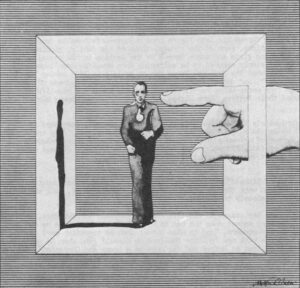My last three newsletters have discussed reader reaction to a preliminary article called “Catch-30 and Other Predictable Crises of Growing UP Adult” (New York Magazine, Feb. 18, 1974).
The article advanced some controversial speculations:
People do not fully outgrow their parents until well into their 40s.
People don’t marry for love. They marry for approval (it’s the thing to do), for safety, so they won’t be alone, for practicality, to pet away from home, to fill some vacancy in themselves.
Marriage often short-circuits young, people’s work on themselves as they slip under a grid of obligations to act as they “should” as spouses and parents.
Several couples and a doctor took issue with me:
From a couple at 30:
Help us — PLEASE-for over five years now -my husband and I have been under the totally misguided belief that we are in love. We were even foolish enough to think we married for love. Of course, after reading your article, I now know that I, brainless woman as I am, married my husband to get out of my parents’ home; and he, old gutless, because he was graduating from law school and everyone else was doing, it. Not only that — we’re 30 and we’re happy — I love being a mother to my two boys, and he loves his role as a father-to make matters totally unbearable, we are each growing as individuals-yes, simultaneously- -Dear God — what are we doing wrong?!!
From a couple approaching 50:
Your sentence, ‘Marriage often short-circuits young people’s work on themselves as they slip under a grid of obligations to act as they “should” as spouses and parents. It was a marvel of genius. Truer words were never spoken. However, I take issue with the basic theme behind your article. You and all the pseudo social scientists, psychiatrists, Dr. Spock and his permissive urh! thinking miss the entire need of mankind. The man, more so than the women, lack moral fiber, moral and mental courage…. The real challenge is to make the woman of my life happy and a part of my life, make it our life.
Your men and women seem to believe the answer lies in running away into the arms of another man or woman. No way lady! The answer lies in taking stock of your assets and saying, this is my last defense. Here I stay and fight. If the two persons are reasonable and unselfish, then the courage should be found and a stand taken…. Crises are never solved by running away. They are only solved by hitting them head on and confronting with reasonable logic, agreed not with love but with logic and understanding.
Yes, you’re right, love is a Hollywoodian trite word. But affection can exist in a marriage and make it work…. It’s time that human fulfillment be bounded by rational curtailment of unnatural desires not required for true maturity and human growth. If all desires sought after by people were granted, then Sodom and Gomorrah are our objectives for the future. I am not preaching the fires of hell bit. What should be taught is that when an undesirable situation exists, running from it is only a futile gesture and the solution to the problem will never arrive via this avenue of escape.
And from partners in their late 50s:
Apparently, in the interviews and surveys, you never either ran across or chose to talk with married couples who really cared for each other, loved each other perhaps in the old Greek sense that two have become one-with each individuality being maintained, and enhanced because of the other. Our experience dates back about 36 years, each of us growing up together, becoming his/her own man/woman because of the love and encouragement of the other. (Three sons, grandparents, etc,) For us, mutual support, stimulation, encouragement are realities of everyday living together.
…I think the whole story boils down to a few essential points. We were never jealous or envious of each other’s activities or skills, nor was there any competition, implicit or otherwise. Nor, and maybe this should have been stated first, were (are) there any secrets, hidden angers. Our thinking has been shared, along with everything else.
From a practicing cardiologist in Seattle:
I am troubled by the difference of retrospective opinions of your interviewees as opposed to some more “objective” understanding of their behavior pattern. Perhaps the “meaning” is their reflected opinion, at least now; but not the whole answer as to their behavior then. But, again, perhaps the “meaning” of past events is mostly as we “see” them now. Perhaps this sort of distinction helps explain
Your “unexpected” lack of sexual motivations in the responses you received as to “Why did you marry?” Certainly, sheer sexual attraction must be a strong initial motivating force in why many marry, but they may not mention this on later reflections.
My answer to the doctor was:
I certainly agree with you about the amnesia factor in people’s attempts to interpret their past behavior. Marcel Proust also said: “Like everybody who is not in love, he imagined that one chose the person whom one loved after endless deliberations and on the strength of various qualities and advantages,” and Shaw added: “When two people are under the influence of the most violent, most insane, most delusive, and most transient of passions, they are required to swear that they will remain in that excited, abnormal, and exhausting condition continuously until death do them part.”
None of the men I interviewed over 30 mentioned that he was in love with his wife when he married her. That “most violent, most insane, most delusive, and most transient of passions” had apparently slipped from mind, as their early illusions were modified by the complexity of actual experience with holding together the thin skein of mutuality between a man and a woman.
There was the usual quota of crank letters. An astrologer gave me the complete rundown on Catch-30 actually being “the Saturn hang-up.” Since it takes roughly thirty years for that planet to travel back to the position in the sky it occupied at anyone’s birth, he believed that Saturn’s orbit was what cleared the focus of each individual’s life at the age of 30.
Among the most helpful letters were those that raised serious concerns about the methods and style I used. On re-reading, I agreed that where I had used the professional jargon it was impenetrable, and that the article’s overall tone — though definitely not my intent — was “a downer.” Things really do get better!
One gentleman in New York, although he said, “She makes many good points that touch on tender nerves — an article full of useful insights,” proceeded to let me have it.
On the other hand, the article is one of the worst written I have ever seen-certainly a disappointment for someone of Ms. Sheehy’s talent. It is full of heavy, pedantic prose, filled with soporific, socio-psychological jargon and is certainly three times as long as it needs to be. Evidently the article is a condensation of a summary of some academic research-and it shows it in spades.
And the New York correspondent for a major newspaper added:
Friends called up to say, “Hey, read that, that’s me she’s talking about.” Terrific.
I have a tiny demurrer, however, Which is, while the article is beautifully conceived and beautifully written, I find the tone oppressive somewhat and wonder whether you’re writing, the book in the same dispirited sense. Obviously, this is just one reader’s opinion, but I found the article’s tone to be dredgingly depressing. Assuming that your further research finds the phases you describe to be valid, does one have to view with and through a 1970s upper-middle-class putdown cynicism?
I’ve had a sub-hobby of reading in the area in which you’re researching and I’ve found that, particularly with Erikson, the reader does not come away with a heavy, goddamit all feeling, but rather with gratefulness for the new insights into self. Erikson somehow makes it all come out with the underlying feeling that growth and crisis is occasionally painful, but that’s a good thing, a healthy thing, an essential and worthwhile thing and not a great big Downer.
Toffler’s Future Shock struck me and some others I know in this way, that he was so personally shook by all these impemanences and changes that he felt they were all a downer, a la the crusted chair-sitters of the Racquet Club, and so the book has somewhat a bad aftertaste, even though its insights can provoke, heal, mend, infuriate, etc.
These last two letters rushed me back to the drafting table.
As I said in the first newsletter of this series, because the article was a preliminary one, I felt like a coach whose team standing, was being assessed at the first batting practice.
Reading and thinking my way through the flood of thoughtful comments from readers, pursing many of their suggestions for further study, resolving to find a simple and positive style of presentation in plain English-all have helped to enrich and correct my perspective.
It seems to me now that I would use my time most responsibly by synthesizing the research in this nascent field, which I have already collected along with the 100 biographies of men and women whom I have interviewed at length. In other words, my own inner imperative on the brink of mid-life is to finish saying, what I have to say. Only then, when speculations have been made on each unfolding and interpenetrating stage of the adult life cycle — for men, women and couples-can a full dialogue begin. Anticipating such an aroused but better-informed debate, I too can hardly wait until my book is out.
Received in New York November 6, 1974
©1974 Gail Sheehy
Gail Sheehy is an Alicia Patterson Foundation award winner on leave from New York Magazine. This article may be published with credit to Ms. Sheehy, New York Magazine, and the Alicia Patterson Foundation.



